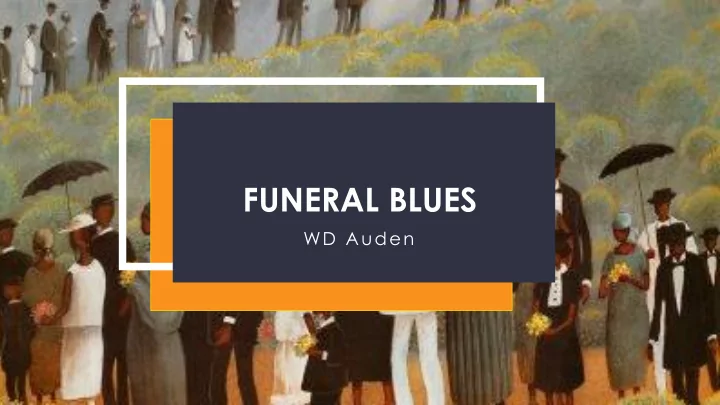

FUNERAL BLUES WD Auden
WH AUDEN • Pulitzer prize winning English poet, author and playwright • Married a woman to allow her to leave Nazi Germany safely • Spent majority of his life with partner, Chester Kallman • Poems influenced by his extensive travel
T H E G E N R E D E V E L O P E D THE BLUES TRADITION F R O M R O O T S I N AF R I C AN M U S I C AL T R AD I T I O N S , AF R I C AN - AM E R I C AN WO R K S O N G S , S P I R I T U AL S , AN D E U R O P E AN - AM E R I C AN F O L K M U S I C . - G C S E B I T E S I Z E “ P E R S O N AL WO E S I N A WO R L D O F H AR S H R E AL I T Y : A L O S T L O VE , T H E C R U E L T Y O F P O L I C E O F F I C E R S , O P P R E S S I O N AT T H E H AN D S O F WH I T E F O L K , [ AN D ] H AR D T I M E S . " - E WAN
Structure Domestic Four quatrains written in rhyming couplets Language of an elegy Public Universal
The speaker lists the things he wants done to make his 1 st Stanza mourning clear. These are based on traditional rituals of mourning that a family would do in preparation for a funeral, to show their personal grief. The sounds that Negative verbs must stop are show that the Stop all the clocks, cut off the telephone, those normal speaker wants Prevent the dog from barking with a juicy bone, domestic sounds. these things to Silence the pianos and with muffled drum cease. They are This image of imperatives. Bring out the coffin, let the mourners come. enjoyment is not allowed. The only ‘allowed’ verbs link There are all typical symbols of death and funerals. with funeral arrangements. The sound devices here help create an atmosphere of suppressed sound. The alliteration in the ‘m’ sounds like humming. The onomatopoeia and assonance reiterate the dull thud of the drum.
2 nd Stanza The speaker focuses on public mourning. His demands (not literal) show how he cannot bear the idea of normal life continuing as usual – he wants everyone to acknowledge this dreadful loss and share his grief . Use of capital letters. ‘He’ – The personification suggests that Decidedly public shows of perhaps the speaker thinks the writing is shaky perhaps as one mourning – grand gestures to everyone should know who who is distraught would write. mimic the enormity of his loss. he is. ‘D’ to emphasise the finality of death. Let aeroplanes circle moaning overhead Scribbling on the sky the message 'He is Dead'. Put crepe bows round the white necks of the public doves, Let the traffic policemen wear black cotton gloves. Contrasting The continuation of the gentler verbs suggest he Interesting indicators of loss. Bows colours catch our knows these are unrealistic requests. attention. around the small, fragile necks of the doves and soft cotton gloves as opposed to leather gloves policemen The onomatopoeia of the moaning planes mimics the usually wear. sound of someone in terrible emotional anguish.
3 rd Stanza The deceased meant everything to the speaker and seems to have been his entire life. He assumed that they would be together forever but that was not meant to be. The metaphor comparing his loved one to the points of the The repetition compass saying, in other words, he was his entire world of the and gave him direction. possessive adjective He was my North, my South, my East and West, emphasizes the Things that bring My working week and my Sunday rest, possessiveness joy to life. of the speaker. My noon, my midnight, my talk, my song; I thought that love would last forever: I was wrong. The loss was unanticipated and therefore even more traumatic. Synecdoche (represents the The alliteration links the words that highlight the day) – their loved one pervasiveness of the loved one in the speaker’s life. pervaded every hour of their day.
As the ultimate expression of grief, the speaker proposes the 4 th Stanza demolition of the entire universe. Without his beloved, there is no pleasure to be found in life. The world is a broken, barren place with no hope for anything positive ever again. These Make it sound like no one instructions all wants them, but really it is link to just him. deconstruction The stars are not wanted now; put out every one, of these natural images. Again, Pack up the moon and dismantle the sun, Ends on a very unrealistic but defeatist and Pour away the ocean and sweep up the wood; indicative of his hopeless tone. The For nothing now can ever come to any good. mindset. speaker can see no point in the things which normally Traditional images in bring joy/wonder. poetry that symbolize life/love/nature. Interesting alliteration of the ‘n’ sound which reinforces the negative words and therefore the negative mood of this stanza.
SOURCES • https://i.pinimg.com/originals/54/77/cc/5477cc90867334d8170bf1c497fc5710.png • https://i.pinimg.com/originals/18/c6/6b/18c66b6962b343981b6447f0ade21705.jpg • https://images.gr-assets.com/authors/1433006801p5/14002590.jpg
Recommend
More recommend